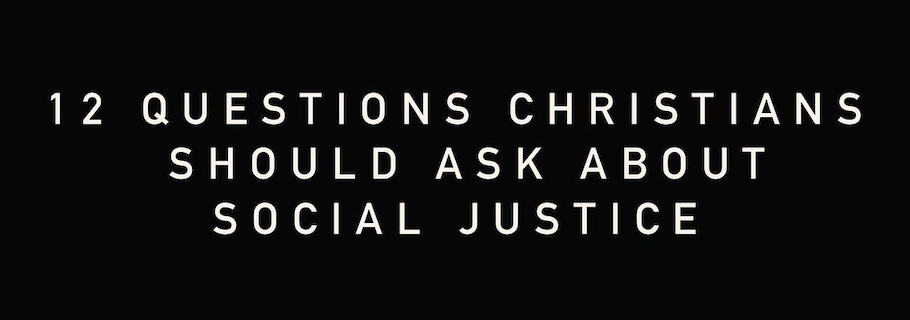Whatever else we might say about the contemporary church, we must say this: We are well resourced. When a new challenge presents itself, when a new teaching arises, when a new heresy appears, it does not take long before we have access to books that address, confront, and correct it. One of the recent challenges to the church is the challenge of social justice—a term that is particularly tricky since it has both negative and positive connotations, both acceptable and troubling definitions. Thaddeus William’s Confronting Injustice without Compromising Truth: 12 Questions Christians Should Ask About Social Justice is an attempt to understand and explain justice from a biblical perspective and to show where society’s vision for justice falls short. It is an attempt that succeeds well.
“I wrote this book because I care about God,” he says. “I care about his church. I care about the gospel, and I care about true justice (though I am zero for four in caring as much as I should). Not all, but much of what is branded ‘social justice’ these days is a threat to all four of those things I hold dear.” His purpose, of course, is not to promote racism or call Christians to apathy in the face of the world’s innumerable injustices. Rather, it’s to provide a positive vision for what the Bible counts as true justice, and to separate this from the many counterfeits being promoted in church and society. “If you also care about advancing the kind of social justice that glorifies God first, draws people into Christ-centered community, and champions the good news of saving grace while working against real oppression, then this book is for you.”
Every book on this subject has to distinguish between two uses of “social justice.” (See my article No One Believes in Social Injustice) Williams does so by referring to “Social Justice A” and “Social Justice B.” He uses “Social Justice A” to speak of the kind of justice “our ancient brothers and sisters did to rescue and adopt the precious little image-bearers who had been discarded like trash at the dumps outside many Roman cities,” as well as the kind of justice exemplified by William Wilberforce, Frederick Douglass, Sophie Scholl, and so on. He contrasts this with “Social Justice B” which depends upon “the ‘oppressors vs. oppressed’ narrative of Antonio Gramsci and the Frankfurt School, the deconstructionism of Michel Foucault and Jacques Derrida, and the gender and queer theory of Judith Butler.” Obviously, then, the kind of justice Christians should pursue is Social Justice A while the kind we should not is Social Justice B. “Where, then, are the boundaries? Where can we march forward together with interlocked arms and biblically faithful hearts? And where might a vision of justice cross the line and lure us away from ‘the faith once for all entrusted to the saints’? Those are crucial questions we must ask if the church is to pierce the political atmosphere of our age without bursting into fragments and flames.”
His book is very much about the crucial distinction between these two forms of justice. And to distinguish between them he frames the book around four groups of three questions each.
- Part 1 focuses on questions related to worship: Does our vision of social justice take seriously the godhood of God? Does our vision of social justice acknowledge the image of God in everyone regardless of size, shade, sex, or status? Does our vision of social justice make a false god out of the self, the state, or social acceptance?
- Part 2 advances to questions related to community: Does our vision of social justice take any group-identity more seriously than our identities “in Adam” and “in Christ?” Does our vision of social justice embrace divisive propaganda? Does our vision of social justice replace love, peace, and patience with suspicion, division, and rage?
- Part 3 turns to questions related to salvation: Does our vision of social justice prefer damning stories to undamning facts? Does our vision of social justice promote racial strife? Does our vision of social justice distort the best news in history?
- Part 4 asks questions about knowledge: Does our vision of social justice make one way of seeing something the only way of seeing something? Does our vision of social justice turn the “lived experience” of hurting people into more pain? Does our vision of social justice turn the quest for truth into an identity game?
A helpful epilogue lays out twelve “clashing doctrines” that distinguish Social Justice A from Social Justice B and provides a call to treat other Christians with great grace, especially those who may not be completely sold out to a false doctrine, but who may be wavering on a couple of points. A series of appendices address several issues closely related to justice such as abortion and the right to life, the changing definition of racism, distinctions between capitalism and socialism, and so on.
Early in the publication process I was asked to read the manuscript and consider writing an endorsement. Once I read it, I was glad to do so. I’ll leave that blurb as my conclusion: Confronting Injustice without Compromising Truth is the book I’ve been waiting for! This is the book that explains and analyzes the social justice movement—that treats it fairly and evaluates it critically. This is the book that prioritizes the gospel as the foundation for any true justice. This is the book that helps Christians understand why they must emphasize social justice, but why they must emphasize the right kind of social justice. This is the book I highly recommend.










